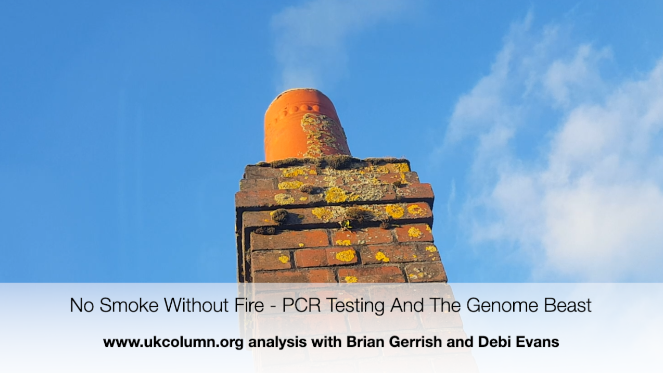Most people believe that a PCR test is a simple test that takes a sample to see if an individual has COVID-19. Some of you may know about PCR testing. Doesn't have a good reputation for accuracy of results and may give erroneous measurements. Despite this significant weakness in effectiveness and accuracy, PCR tests have been promoted to wide swathes of the population with almost religious zeal by the UK government. The government's consistent line is that everyone should undergo regular PCR tests.
However, is the promotion of COVID-19 testing just a smokescreen when it comes to PCR testing? The answer to this simple question is simply, “Yes, that's right.” In reality, PCR tests have another, much more important role. It's about sampling DNA data to facilitate genome sequencing (the name for reading the genetic code of the human body's makeup).
Pre-COVID-19, the DNA sampling industry was limited to working with accessible medical samples and voluntary DNA samples that individuals provide, for example when they hand over a sample to a genealogy site to find out their family history. It had been.
PCR testing for COVID-19 on millions of people has turned this DNA data gap into a data flood. And that data is worth money. As we'll see later, it costs a lot of money.
In this latest version, There's no smoke without firequalified PCR test and Genome BeastBrian Gerrish talks with Debi Evans about her work on the whole subject of genome sequencing and where it leads.
The genome sequencing industry is a beast of enormous scale behind the scenes. Globally, the industry is already worth billions of pounds and is expected to grow rapidly from this already huge financial base. The top 10 genome sequencing companies alone were worth more than £635m in 2020.
Debi became interested in PCR testing when she learned that Illumina was the company responsible for PCR testing for the novel coronavirus disease (COVID-19). But it soon became clear that Illumina was much more than meets the eye. Illumina says of itself:
Illumina's goal is to apply innovative technologies to the analysis of genetic variation and function, enabling research that was unimaginable just a few years ago. Providing innovative, flexible and scalable solutions that meet our customers' needs is extremely important to us. As a global company focused on collaborative interaction, rapid delivery of solutions and the highest level of quality, we strive to meet this challenge. Illumina's innovative sequencing and array technologies are powering breakthrough advances in life sciences research, translational and consumer genomics, and molecular diagnostics.
illumina.com
But it turns out that Illumina is just one company among many. That path led to genome sequencing and a very large and murky pool of related companies such as Grail, the Wellcome Sanger Institute, UK Biobank, Twins UK, Amgen, Mayo Clinic and Genomics England. All of these companies overlap with gene editing technologies such as: Crisper. Governments and militaries will also be involved, including ARIA and ARPA in the UK and DARPA in the US. British academia is also firmly entrenched in this system, with the University of Oxford and Imperial College London just two of the many institutions at the forefront.
In the midst of all this, the UK's Medicines and Healthcare products Regulatory Agency (MHRA) seemed strangely silent on the subject of vaccine data. As it turned out, the company collected yellow card vaccine adverse reaction (ADR) data, but did not release details of the safety analysis of the collected data itself. So where does that vaccine ADR data go?
Similarly, the National Health Service (NHS) is a major collector of DNA data, but there is little public explanation of where that data goes or why.
Our discussion also moves to those involved in the genome sequencing trail. Professor Sally Davis writes in her book: Chief Medical Officer Annual Report 2016 that:
Genomics is not tomorrow. Here it is today. I believe that genomics services should be a cost-effective service in the NHS and should be made available to more patients. This is an exciting science with the potential to bring about incredible improvements in prevention, health protection, and patient outcomes. We are now in the era of genomics, and we must realize the dream of genomics.
Sally C. Davies, Chief Medical Officer for England, 2016
But if Dame Sally's professional enthusiasm is understandable, why is former Prime Minister's chief of staff Dominic Cummings so passionate about the topic of genomes? personal blogHis language, thoughts, and fantasies are breathtaking and very dark. He speaks clearly about the idea that people can and will change, be redesigned, and be “improved.” Implicitly, we see that there is no room for the weak or vulnerable in Cummings' world. And if humans can integrate with computers and AI, even better.
If Mr Cummings’ efforts are limited, at least within the UK government, then the World Economic Forum’s June 2020 white paper Genomic data policy frameworks and ethical tensionsand the World Health Organization. 2002 Health Research Advisory Committee Report.
Ultimately, our research touches on an even broader plan for the 'benefits' of genome sequencing and editing: behavioral insights, allowing people to be re-engineered to have the right thoughts, feelings and behaviors. . This includes appropriate political alignment in these areas.
Against this backdrop, we need to take into account the words of British Prime Minister Boris Johnson, who said the UK could become a world-leading “scientific powerhouse” in these fields.
Want to learn more? So join us for a first overview. PCR test and Genome Beast.


